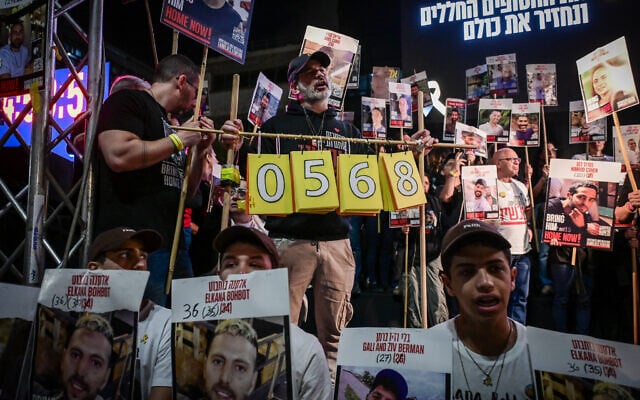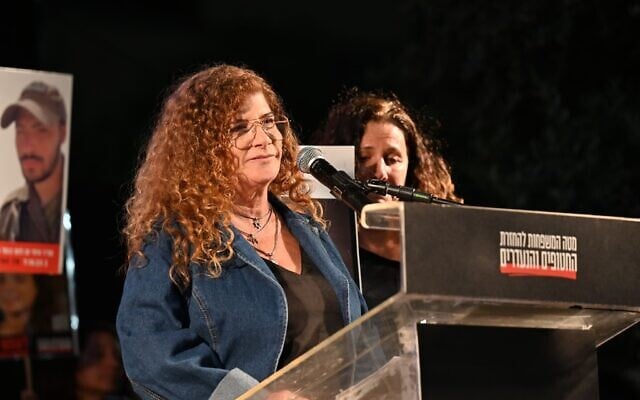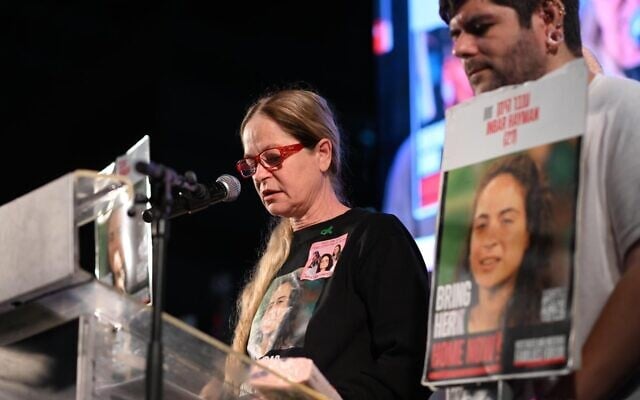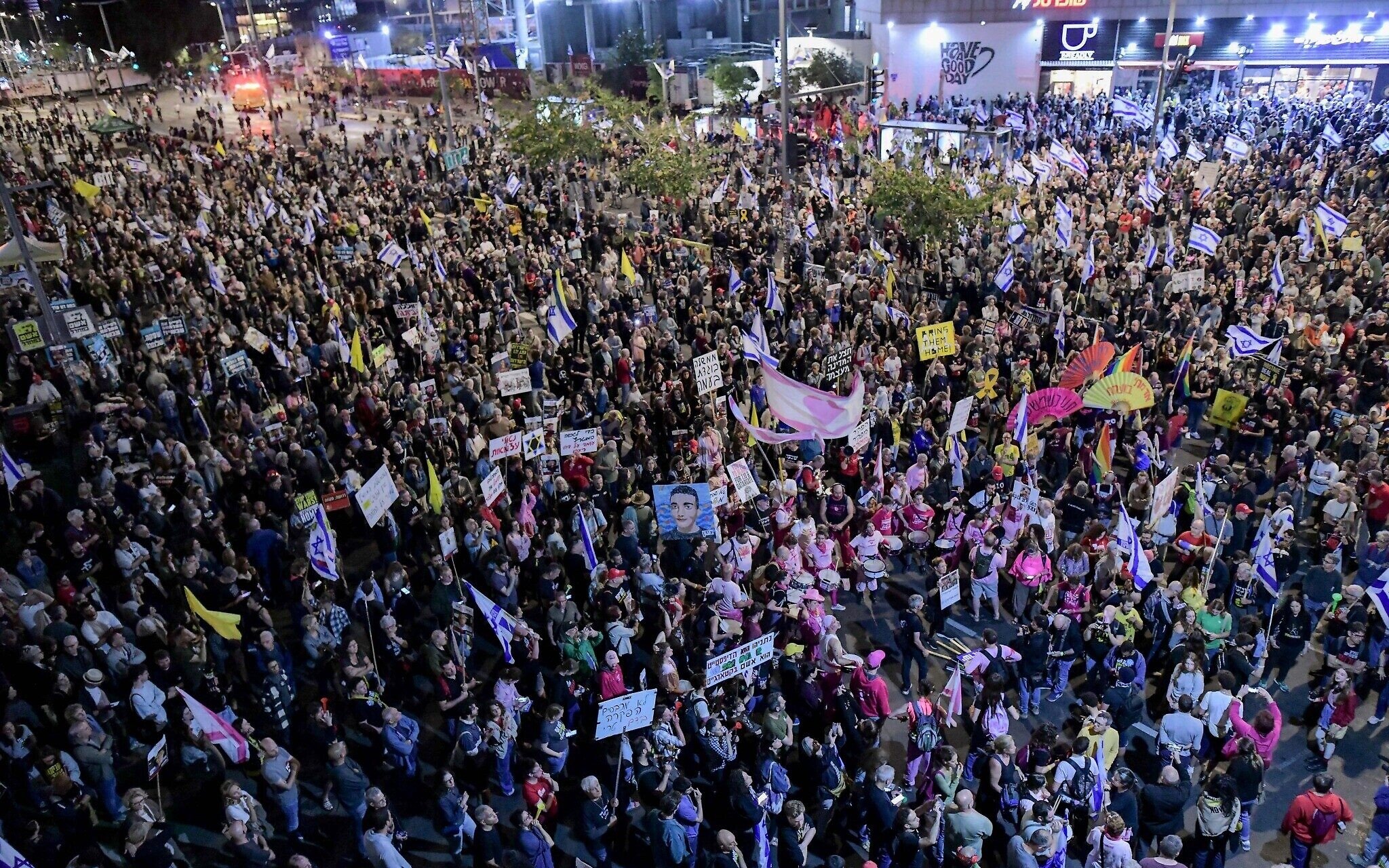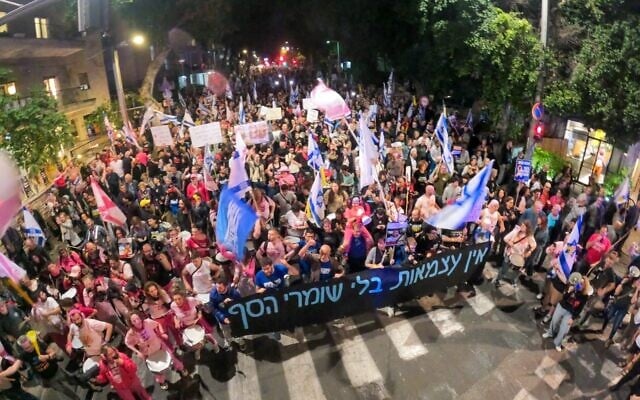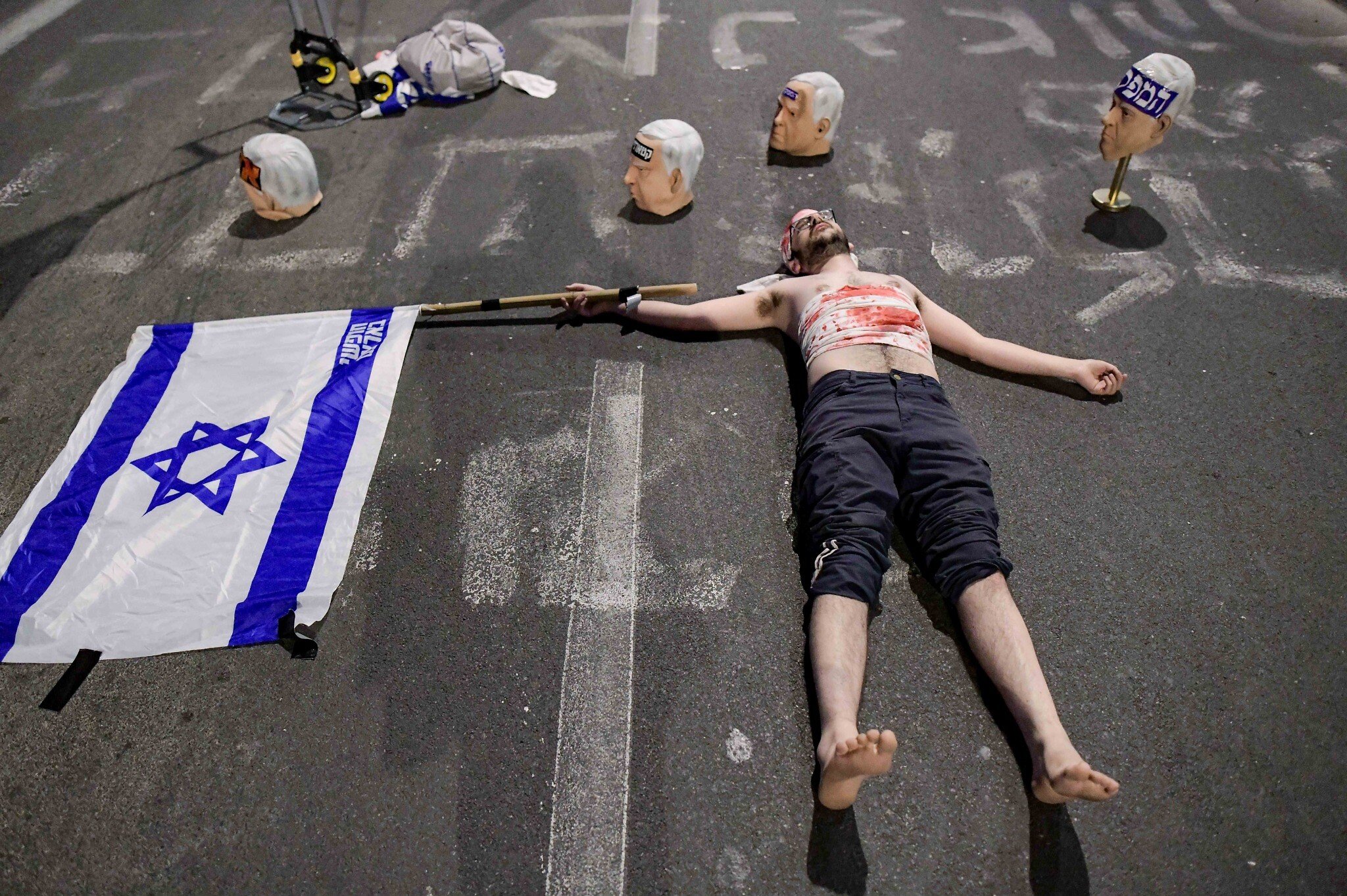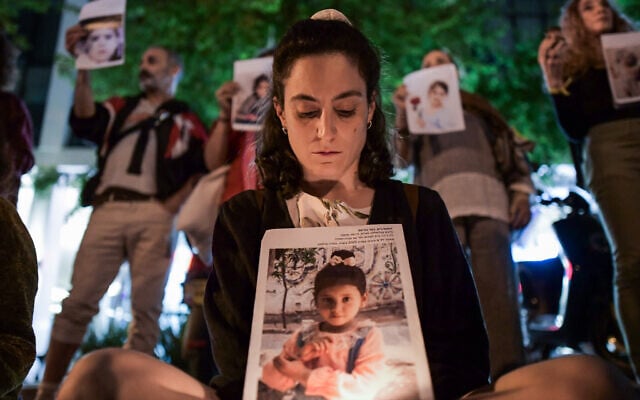


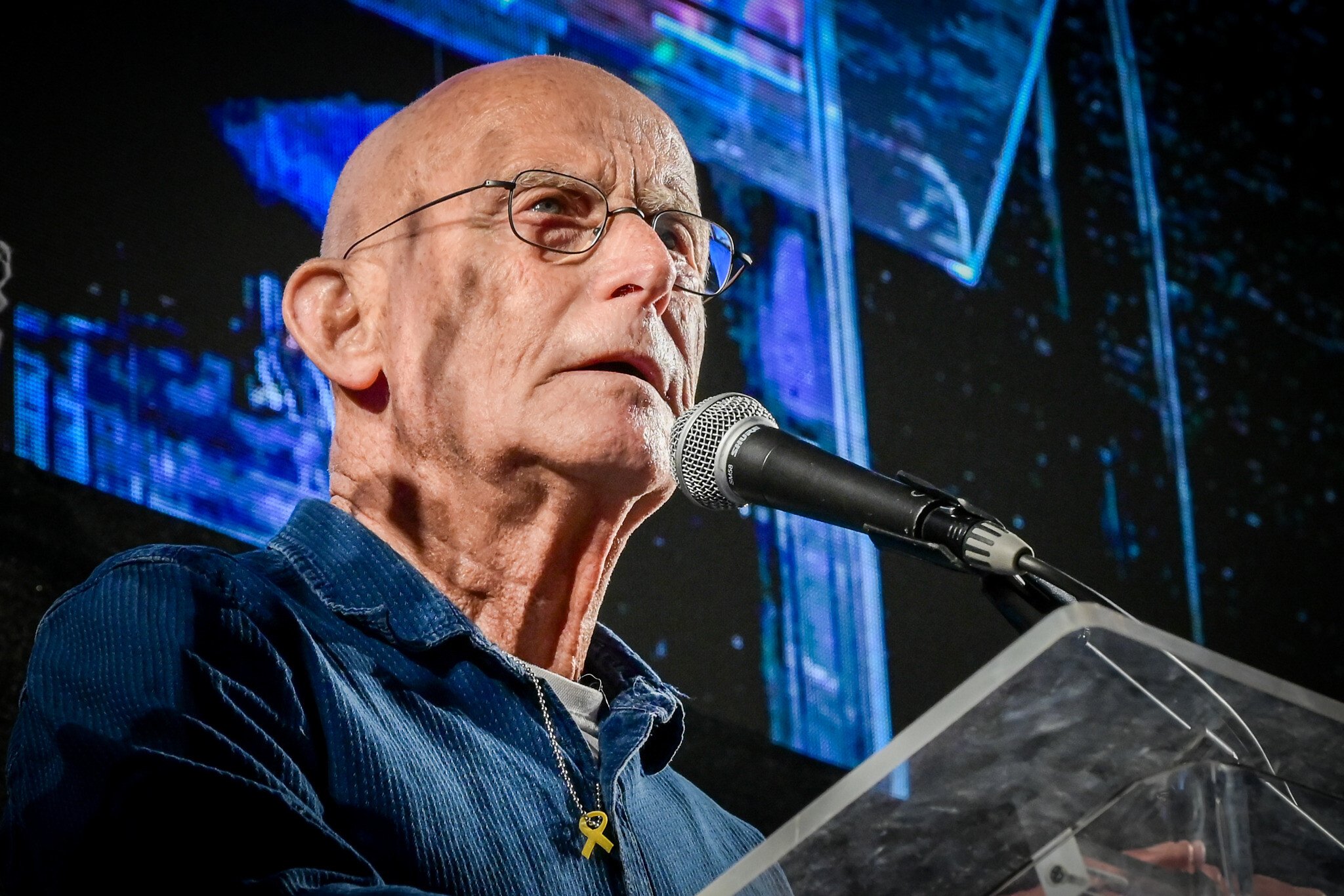
Thousands gathered at demonstrations across Israel on Saturday night to protest against Prime Minister Benjamin Netanyahu’s government and to call for a deal that would return the remaining 59 hostages and bring an end to the war in the Gaza Strip.
The main rally against the government took place at Tel Aviv’s Habima Square, where protesters gathered to hear from a number of senior officials including the former heads of the Shin Bet and Israel Defense Forces, while protesters demanding a hostage deal gathered at the nearby Hostages Square. The rallies then merged on Begin Road, as they do each week.
Speaking at a press conference ahead of the evening’s events, Einav Zangauker, whose son Matan is held hostage, charged that Israel could sign a deal and bring the hostages home “tomorrow morning” if it wished to.
“Soldiers are being sent to war without end, without purpose, and without concern for the day after,” she said, standing alongside a group of hostages’ relatives. “It is possible to sign a deal tomorrow morning. An entire nation is being deceived. We are told that military pressure will return the kidnapped — it only kills them.”
The “entire nation” wants an end to the war and the return of all the hostages, Zangauker asserted, accusing Netanyahu of “doing himself a favor, by agreeing, perhaps, to another ‘selection’ deal” — comparing the phased hostage release deals favored by Netanyahu to the Nazi practice of sending sickly Jews to die and healthy Jews to slave labor.
Alongside Zangauker, Yehuda Cohen, the father of hostage Nimrod Cohen, slammed the premier for characterizing the return of all hostages in exchange for an end to the war as “surrender.”
“A prime minister who sees the return of hostages captured under his watch as surrender is a criminal against his own people,” Cohen said. “His goal is to waste time and stay in power. He turned Nimrod and the hostages into pawns on his chessboard long ago.”
Hours later, speaking at the more apolitical rally at Hostages Square, former hostage Meirav Tal, who was released as part of a weeklong truce in November 2023, echoed the call of the other hostage families for one final deal to return all the remaining hostages at the same time.
“Not some of them, not when it’s comfortable — everyone,” said Tal, whose partner Yair Yaakov was killed and taken to Gaza during the assault on Kibbutz Nir Oz.
Asserting that the government’s sole duty is to return all those snatched by invading terrorists during the October 7, 2023, Hamas-led onslaught, Tal recalled the”terrible desperation” that she felt while held hostage, when she heard far-right National Security Minister Itamar Ben Gvir say he would not vote for the deal that ended up freeing her.
“I didn’t understand how a Jew, a brother of my nation, was able to say he didn’t want us to return,” she said. “That place — dark, cold, scary — leaves you with little hope. Then someone from home, from my people, comes and takes that away too.”
The rally at Hostages Square focused heavily on the national days that are observed in Israel in the weeks after the Jewish holiday of Passover — Holocaust Remembrance Day, followed by Memorial Day and then Independence Day.
Hannah Cohen, the aunt of slain hostage Inbar Haiman, whose body is still being held by Hamas, took to the stage to appeal for the government to facilitate the return of her niece’s body for burial in Israel ahead of Memorial Day later this week, and bring an end to “the nights of crying into a pillow. The memorial days without a grave.”
“Inbar, our beloved girl, we are murdered with you, every day. Every hour,” she said. “Others will not understand what the family of a slain hostage goes through.”
“I turn to the prime minister and ask him to bring us back all the hostages who were abandoned and abducted from the Land of Israel,” she pleaded. “In one go. All 59 hostages. The living for rehabilitation and the deceased — for a proper burial in their own country.”
“Because remembering them is returning all of them,” said Cohen. “Because giving up on them is to give up on ourselves.”
At the parallel protest in Habima Square, protesters struck a distinctly more political tone, the crowd awash in Israeli flags as they demonstrated against Netanyahu and his government.
Ahead of the speeches, a large screen played a brief history of Ben Gvir, who began his political life as a disciple of extremist Rabbi Meir Kahane, and an avowed fan of Kahane’s disciple Baruch Goldstein, who murdered 29 Muslim worshipers at the Tomb of the Patriarchs in Hebron in 1994.
The short film accused Netanyahu of normalizing the Kahanist movement four decades after the High Court blocked it from running for parliament.
Afterward, thousands gathered to listen as former Shin Bet chief Ami Ayalon called the affidavit submitted by incumbent head Ronen Bar to the High Court against Netanyahu this past week a “pivotal event in our fight for the Jewish-democratic identity of Israel.”
If the premier uses the domestic security agency to “carry out surveillance of citizens who wish to protest — the black flag is flown before our eyes,” said Ayalon, referring to one of Bar’s accusations against the premier in the document.
In Israeli jurisprudence, a “black flag” is said to fly over orders whose sheer immorality makes them illegal to follow. The phrase was coined by a judge who, in 1957, handed down prison sentences to soldiers who killed 49 civilians in the Arab town of Kafr Qasim for missing a curfew.
“Take to the streets, stop the country,” said Ayalon. “Non-violent civilian revolt is the civic duty of every citizen.”
“We are fighting for Israel’s Jewish-democratic identity as formulated by the founding fathers in the Declaration of Independence,” he said.
His comments were echoed later by protest leader Shikma Bressler, who told the crowd that “a black flag flies over” all of Netanyahu’s decisions.
Joining the list of former high-ranking officials condemning Netanyahu’s leadership, former IDF chief Dan Halutz accused the premier of continuing the fighting in Gaza simply to keep the government intact.
The war is “unnecessary” and driven by Netanyahu’s coalition partners’ “religious, mystic, messianic delusions that have nothing to do with national security,” said Halutz on stage at Habima Square.
“The defendant Benjamin Netanyahu,” who is on trial for corruption charges, poses a “clear, present and immediate danger to the state of Israel,” he said.
Later, after both protests merged in front of the IDF headquarters on Begin Road, Ruhama Albag, whose niece Liri was released from Hamas captivity in January, warned the government that if the war continues, the upcoming Memorial Day “will be your disgrace and infamy.”
She slammed Netanyahu for staying silent as his political allies expressed ambivalence to the fate of the remaining captives.
“Silence is filth,” said Albag, a literary scholar, paraphrasing a poem by the late Revisionist Zionist leader Zeev Jabotinsky.
She ticked off recent statements by Netanyahu’s political allies: Bezalel Smotrich, “the scoundrel known as finance minister,” who said this week that the hostages’ lives are not the top priority; lawmaker Zvi Sukkot, “the new Temple Mount carpet,” who prostrated himself at the holy site “to create another provocation,” and called on Netanyahu to refuse a potential court order to recuse himself; and lawmaker Simcha Rothman, who said “the correct way to free the hostages is to not meet with the families.”
And then there is “the worst statement of all,” she said: “The prime minister is silent.”
Albag accused the elected officials of disregard for the “mothers and fathers who, powerless, continue to raise children in captivity.”
“Alon Ohel is going blind. Matan Angrest is getting electrocuted by a car battery. Nimrod Cohen’s mother says, with relief, that he is still standing on his feet. It’s doubtful if Matan Zangauker will be able to stand,” said Albag, referring to young men still in captivity.
She read the names of the other captives still believed to be alive — 24 in all — noting with anger Netanyahu’s reported attempt to “console us” last year by saying that the captives were “suffering but not dying.”
“End this blood-soaked war,” said Albag. “If not, this Memorial Day will be your disgrace and infamy.”
The anti-government demonstrations were not without controversy, and drew the attention of a separate right-wing group of hostage families and Netanyahu himself, who condemned a display set up by protesters of masks bearing his face surrounding a demonstrator wearing faux-bloody bandages lying in the middle of the street.
“This needs to be said in a clear voice. The severed heads, as well as the protests today, have nothing to do with the hostages,” the conservative Tikva Forum wrote, in a post shared by Netanyahu’s official X account. “On the contrary, these are people who decided to sacrifice the hostages in an attempt to overthrow the government.”
“In a civilized country, there would already be dozens of people arrested for inciting murder. It is unclear where the Shin Bet is when it comes to these clear and dangerous representations of murder,” the group wrote, adding that it hopes tensions between Netanyahu and Shin Bet chief Bar “do not affect the Shin Bet’s positions on everything related to the prime minister’s security.”
Netanyahu and his political allies have long complained about incitement against him and his family, pointing fingers at the justice system, law enforcement and the attorney general for what they say is unchecked violent speech by members of the public.
In a separate statement, a spokesperson for Netanyahu’s Likud party called the protest display “madness,” and asserted that it “represents incitement to murder the prime minister and behead him.”
“Where is the enforcement of the attorney general and Ronen Bar?” the spokesman asked, attaching a photo of the scene, in which the shirtless, bandaged man clutched an Israeli flag.
Surrounding the man’s head were several masks of Netanyahu, each with a sticker bearing a slogan such as “guilty” or “danger.”
Elsewhere in Tel Aviv, some 200 left-wing activists stood in silence on Kaplan Street, holding up pictures of children killed in the Gaza Strip since Israel renewed its offensive there on March 18.
They stood surrounded by Neshama candles — long-burning candles traditionally lit by Jews to commemorate the dead.
Signs showed each slain child’s name, and the date, place and circumstances of their death.
The children “were and are no longer,” the signs read, highlighting how they were caught up in the fighting against their will.
The somber scene was upended as anti-government protesters marched through, shouting slogans and beating drums as they headed toward Begin Road. The left-wing activists stayed put.

